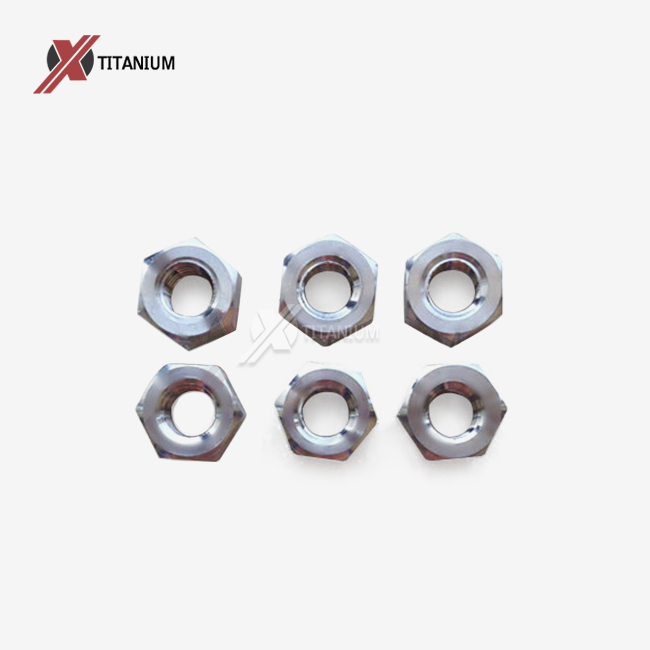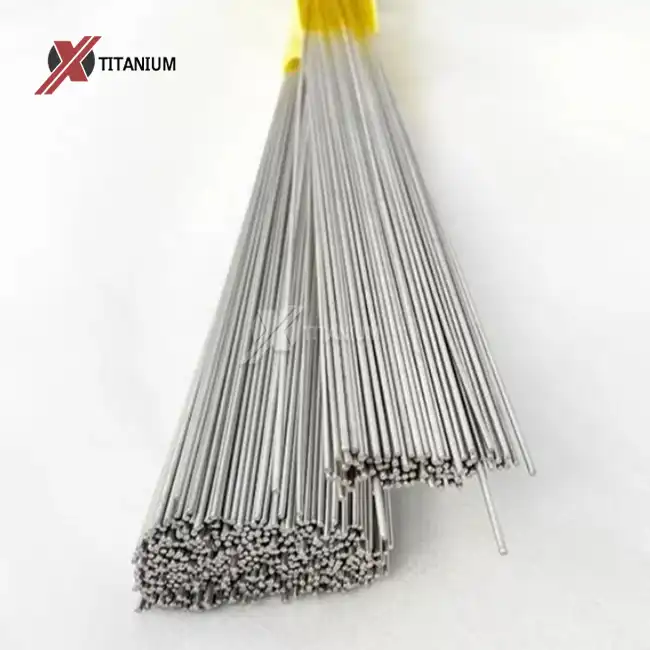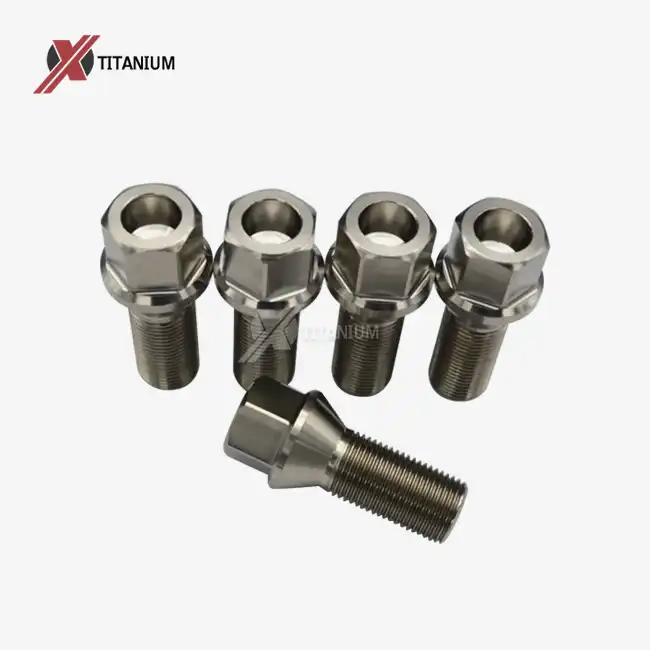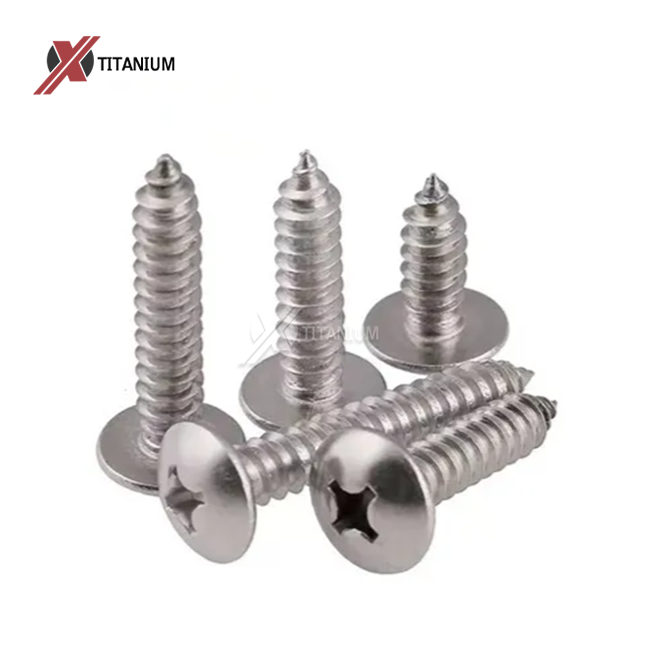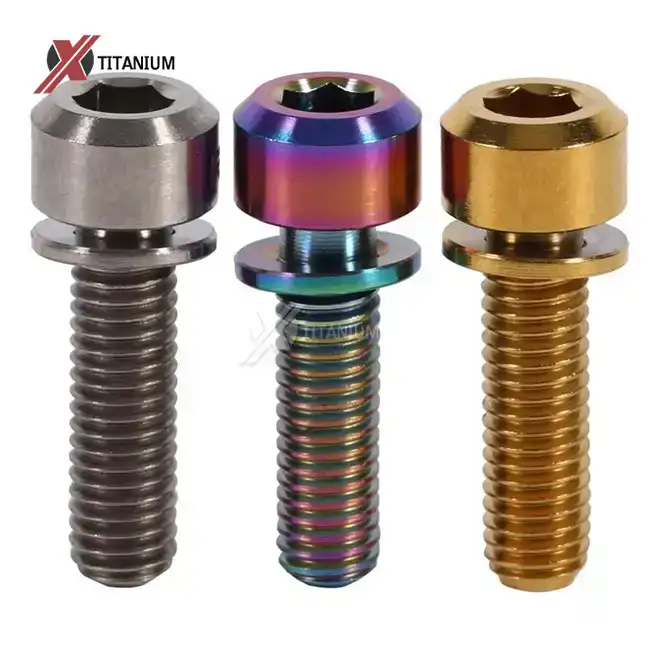The Unique Properties of Titanium in Marine Environments
Corrosion Resistance: Titanium's Natural Defense Against Seawater
Titanium's exceptional corrosion resistance stems from its ability to form a stable, protective oxide layer when exposed to oxygen. This natural barrier shields the underlying metal from chemical attack, making titanium hex nuts virtually impervious to the corrosive effects of saltwater. Unlike traditional steel or even stainless steel fasteners, which can succumb to pitting and crevice corrosion in marine environments, titanium nuts maintain their integrity over extended periods, even in the most aggressive seawater conditions.
The oxide film on titanium is remarkably tenacious, rapidly reforming if damaged. This self-healing property ensures continuous protection against corrosion, even if the surface is scratched or abraded. For marine applications where constant exposure to saltwater is unavoidable, this inherent corrosion resistance translates to significantly reduced maintenance requirements and extended service life for underwater structures and equipment.
Strength and Durability: Withstanding Oceanic Forces
Marine grade titanium hex nuts boast an impressive strength-to-weight ratio, offering superior mechanical properties while keeping overall weight to a minimum. This characteristic is particularly advantageous in deep-sea applications, where every gram matters. The high tensile strength of titanium alloys used in these fasteners ensures they can withstand the immense pressures encountered at extreme depths without compromising structural integrity.
Moreover, titanium's fatigue resistance is exceptional, allowing titanium hex nuts to endure cyclic loading and unloading – a common scenario in marine environments due to wave action and tidal forces. This resilience to fatigue stress significantly reduces the risk of fastener failure, enhancing the overall safety and reliability of marine structures.
Temperature Resistance: Performing in Extreme Conditions
The ocean environment presents a wide range of temperature challenges, from the freezing conditions of polar waters to the scalding temperatures near hydrothermal vents. Titanium hex nuts excel in these extreme conditions, maintaining their mechanical properties across a broad temperature spectrum. Unlike some materials that become brittle in cold waters or lose strength at elevated temperatures, titanium remains stable and dependable.
This temperature versatility makes titanium fasteners ideal for use in diverse marine applications, from arctic research stations to deep-sea oil and gas extraction equipment. The ability to perform consistently across varied thermal conditions ensures that structures and machinery remain secure and operational, regardless of the surrounding water temperature.
Applications of Marine Grade Titanium Hex Nuts
Offshore Oil and Gas Platforms
In the demanding world of offshore oil and gas extraction, marine grade titanium hex nuts play a critical role in ensuring the structural integrity and longevity of platforms and equipment. These fasteners are used in various components, from the main support structures to the subsea production systems. The corrosion resistance of titanium is particularly valuable in this industry, where the combination of saltwater exposure and potential contact with corrosive hydrocarbons creates a highly aggressive environment.
Titanium hex nuts are often employed in critical joints and connections, where failure could have catastrophic consequences. Their ability to maintain tight tolerances and resist loosening under vibration and cyclic loading makes them ideal for securing vital equipment and ensuring safe operations in the challenging offshore environment.
Marine Research and Exploration Vehicles
Advanced marine research vessels and deep-sea exploration submersibles rely heavily on titanium fasteners, including hex nuts, to withstand the extreme pressures and corrosive conditions of the deep ocean. These vehicles often operate at depths where standard materials would quickly fail, making the use of marine grade titanium components essential.
Titanium hex nuts are used in the construction of pressure hulls, sensor mounts, and propulsion systems of these sophisticated machines. Their light weight contributes to the overall buoyancy management of submersibles, while their strength ensures the integrity of critical systems under intense hydrostatic pressure. The corrosion resistance of titanium also protects sensitive scientific equipment from degradation, enabling long-term deployment in oceanic research projects.
Underwater Construction and Infrastructure
As coastal and offshore infrastructure projects become more ambitious, marine grade titanium hex nuts find increasing use in underwater construction. From bridge supports to underwater tunnels and tidal energy systems, these fasteners provide the durability and reliability needed for long-term submerged structures.
The use of titanium fasteners in these applications not only enhances the structural integrity but also significantly reduces maintenance requirements. This is particularly important for underwater structures, where access for inspection and repair can be challenging and costly. The long-term cost savings achieved through reduced maintenance and extended service life often offset the initial higher cost of titanium components.
Innovations and Future Trends in Marine Grade Titanium Fasteners
Advanced Alloy Development
Ongoing research in titanium metallurgy is leading to the development of new alloys specifically tailored for marine applications. These advanced materials aim to further enhance the already impressive properties of titanium, focusing on increased strength, improved fatigue resistance, and even better corrosion performance in extreme environments.
Some promising developments include beta titanium alloys with enhanced ductility and toughness, making them ideal for applications requiring both strength and flexibility. Additionally, researchers are exploring titanium matrix composites, which could offer unprecedented combinations of strength, lightness, and corrosion resistance for next-generation marine fasteners.
Surface Treatment Innovations
While titanium naturally forms a protective oxide layer, innovative surface treatments are being developed to enhance its performance even further. These treatments can improve wear resistance, reduce friction, and even provide additional corrosion protection in the most aggressive environments.
Techniques such as plasma electrolytic oxidation (PEO) and ion implantation are showing promise in creating super-hard, wear-resistant surfaces on titanium fasteners. These treatments could extend the application range of titanium hex nuts to include high-wear scenarios in marine environments, further increasing their versatility and lifespan.
Integration with Smart Technologies
The future of marine grade titanium hex nuts may lie in their integration with smart technologies. Researchers are exploring ways to incorporate sensors and monitoring systems directly into fasteners, allowing for real-time structural health monitoring of marine installations.
These "smart" titanium fasteners could provide valuable data on stress, strain, and environmental conditions, enabling predictive maintenance and enhancing safety in critical marine applications. The development of such intelligent fastening systems could revolutionize the way we monitor and maintain underwater structures and equipment.
Conclusion
Marine grade titanium hex nuts represent a pinnacle of engineering for oceanic applications, offering unmatched corrosion resistance, strength, and reliability in some of the world's most challenging environments. As we continue to push the boundaries of marine exploration and exploitation, these robust fasteners will undoubtedly play an increasingly critical role in ensuring the safety, longevity, and efficiency of underwater structures and equipment.
The ongoing innovations in titanium alloy development, surface treatments, and smart technologies promise to further enhance the capabilities of these essential components, opening up new possibilities for marine engineering and construction. For industries operating in harsh marine environments, the investment in high-quality titanium fasteners is not just a choice, but a necessity for long-term success and sustainability.
For more information about marine grade titanium hex nuts and other titanium products for demanding applications, please contact us at info@cltifastener.com or djy6580@aliyun.com. Our team of experts is ready to assist you in finding the perfect titanium solutions for your marine projects.
